Celebrating Manama being chosen as Capital of Arab Tourism 2013, the Bahraini Ministry of Culture holds several events showcasing Arab culture. So far, the festivities included a musical performance Ibn Battuta, Prince of Arab Travelers. The two-time performance was staged at the newly-opened Bahrain National Theatre in Manama.
Born on 24 February, 1304 AD Abu Abdullah Mohamed Ibn Abdullah Al Lawati Al Tanji Ibn Battuta, also known as Ibn Battuta has traveled across the world, from the city of Tangiers in his homeland Morocco, through North Africa, where he passed by Egypt, to the Middle East, Iraq and Levant countries, then to the Gulf region: Oman, Bahrain and further towards Turkistan and far Asia: India, China, Java. His travels also included several countries in central Africa. Understandably, the choice of Ibn Battuta as symbol of Arab tourism is strongly related to the concept of his extensive travels.
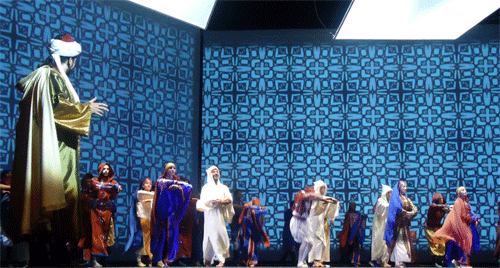
Ahmed Ezz as Ibn Battuta Junior and Enana Dance Theatre (photo: Ati Metwaly)
While travelling, Ibn Battuta developed relations and friendships with many kings and princes who gave him gifts and support to pursue his travels. He documented all his experience in his famous manuscript, A Gift to Those Who Contemplate the Wonder of Cities and the Marvels of Travelling.
The performance staged in Manama on 25 and 26 February, concentrated on presenting a few important stops of Ibn Battuta's travels, and cultural riches that characterize the regions he visited: Morocco, Egypt, Levant and Bahrain as one of the pillars of his voyages across Gulf region.
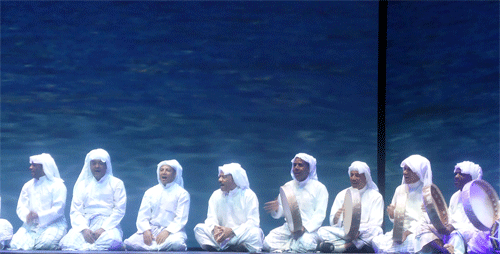
Traditional Bahraini singers in final Gulf scene (photo: Ati Metwaly)
The performance was a large production and relied on the artistic force of two hundred international artists. Artistic producer Ahmed Abouzahra, General Manager of East West Art Promotion and Arabesque International, brought Wroclaw Philharmonic Orchestra from Poland, Enana Dance Theatre from Syria and a large number of artists from Bahrain, Egypt, Syria, Palestine, Hungary, France, and Russia etc to offer their expertise to serve the show.
Hisham Gabr (Egypt) composed the music and conducted the Wroclaw Philharmonic Orchestra, which was joined by a group of Oriental musicians and choir from Egypt. Gabr has created grand music, characteristic to each region depicted in consecutive scenes by merging Occidental harmonies with Oriental modes.
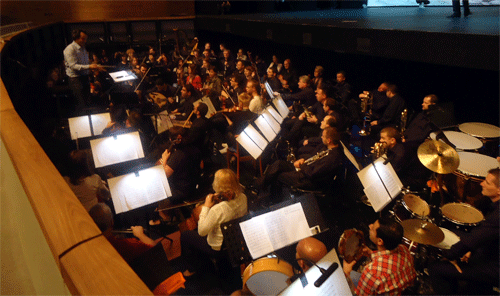
Wroclaw Philharmonic Orchestra and conductor Hisham Gabr, dress rehearsal (photo: Ati Metwaly)
Nader Salaheldin (Egypt) directed the show and provided the script. Dina Nadeem (Egypt) designed costumes, which captured the essence of each regions’ traditional clothing, while giving them an elegant modern touch.
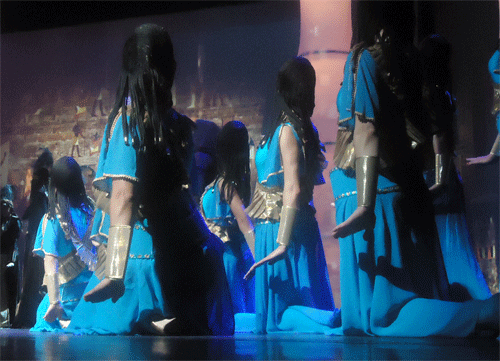
Enana Dance Theatre in Egypt scene (photo: Ati Metwaly)
Albina Belova and Jehad Mufleh, General Manager of Enana Dance Theatre, choreographed for the dance troupe.
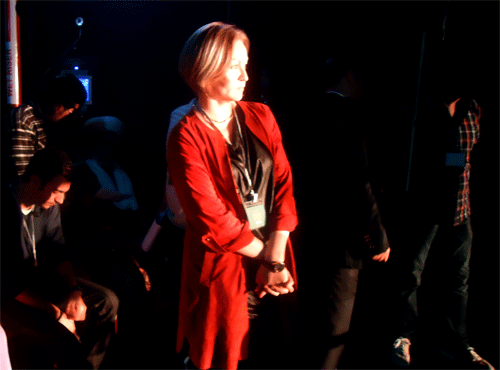
Choreographer Albina Belova watches the dancers from the backstage (photo: Ati Metwaly)
Csaba Kael, General Manager of the National Centre for the Performing Arts in Budapest (Hungary) supervised the creative vision, providing his team with video projections; Éva Szendrényi (Hungary) took care of the scenography; specialists from France were responsible for the lighting design; Bojan Ugrinovski from Macedonia was behind the sound engineering.
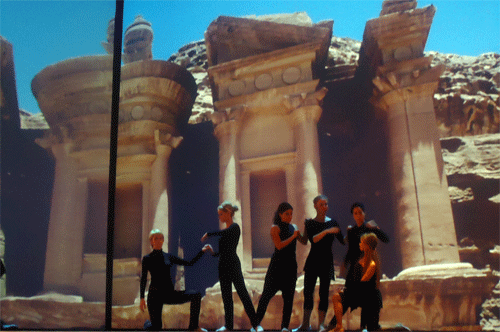
Video Projections behind the dancers from Enana Dance Theatre, photo from rehearsals (photo: Ati Metwaly)
A number of well-known singers and actors also performed: renowned Egyptian actor Abdelrahman Abou-Zahra (Egypt) was in the leading role of Ibn Battuta Senior. His everlasting charisma and presence reminded us of the greatest masters of the Egyptian theatre.
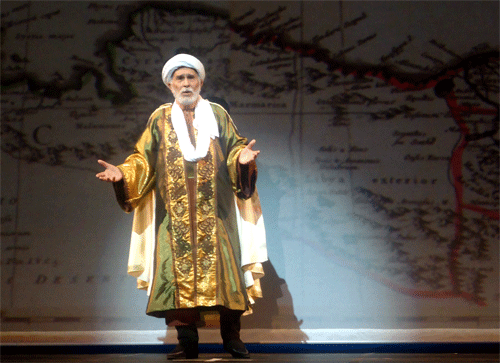
Abdelrahman Abou-Zahra as Ibn Battuta Senior (photo: Ati Metwaly)
Ahmed Ezz sung the role of Ibn Battuta Junior while three stars of the Arabic music embellished chosen scenes: Amal Maher (Egypt) sung in Egypt's scene, Ghada Chbeir (Lebanon) in the Levant scene, Hind (Bahrain) in the final Gulf scene where additional regional dialects were expressed by Bahraini traditional music troupe. The wonderful timbre of Ghada Chbeir and her remarkable performance garnered the audience’s strong applause.
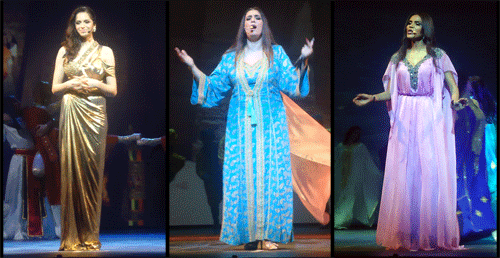
Amal Maher, Ghada Chbeir, Hind (photo: Ati Metwaly)
The Ibn Battuta performance was attended by Sheikha Mai Bint Mohammed Al Khalifa, the Culture Minister of the Kingdom of Bahrain and a large number of important officials from the Arab World. Also among the audience were Nabil Elaraby, an Egyptian diplomat and currently the Secretary-General of the Arab League; Yehia El-Gamal, an Egyptian lawyer and politician and Salah Fadl, Egyptian literary critic. They especially pointed out the music composed by Hisham Gabr and the Wroclaw Philharmonic Orchestra, as well as costumes designed by Dina Nadeem as stars of the show.
Equally, Jan Nast, the Managing Director of the Staatskapelle Dresden, one of the world's oldest and most prestigious orchestras, who attended the second performance, underscored the success of the music in the whole performance.
******
Overlooking the sea, Bahrain National Theatre, which opened in November 2012 is a new gem on the Arab cultural arena, valued at $50 million (Dh183.60 million).
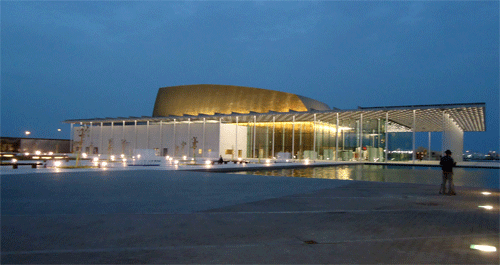
Bahrain National Theatre (photo: Ati Metwaly)
Designed to resemble a boat, the theatre includes a large hall with walls and balconies covered in wood and a 1001-seat auditorium, a number to reflect on the One Thousand and One Nights. On the other hand, the stage and audience in a small hall that can accommodate around 300 people can rotate according to the needs of the performance. With white, shell-like staircases and wooden interior, the building is a combination of modernity and the most captivating elements from Arabian tales.
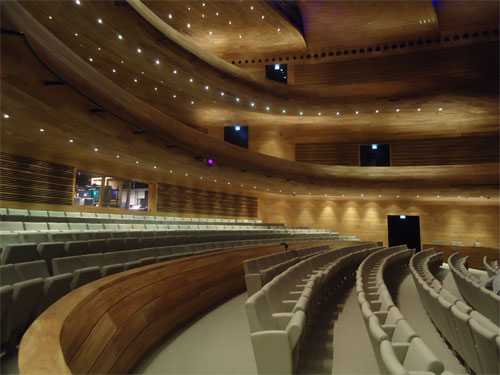
Bahrain National Theatre, main hall (photo: Ati Metwaly)
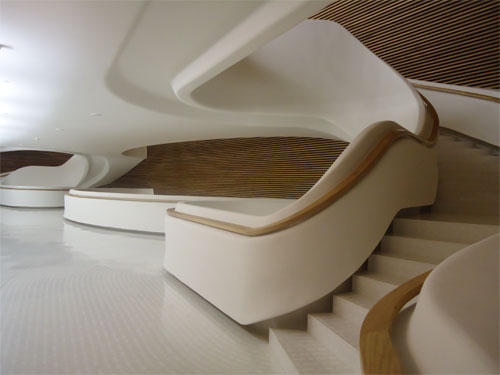
Bahrain National Theatre, main staircase (photo: Ati Metwaly)
Although there is still some construction being finalised, the theatre building is already serving as home to a number of concerts and performances. The upcoming performances staged at the Bahrain National Theatre will include Il Divo's unique operatic voice arrangements, Jahida Wehbe from Lebanon, Chares Aznavour, Mahler Chamber Orchestra, Ballet Revolución from Cuba, Yanni, Kadim Al Sahir, along with other musicians, topped with art exhibitions, lectures and poetry readings.
Short link: